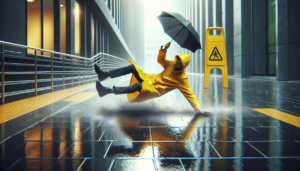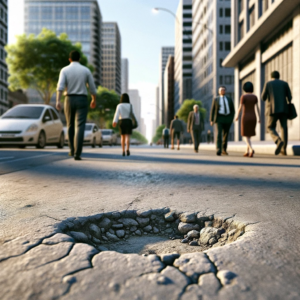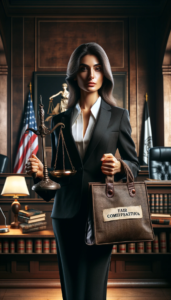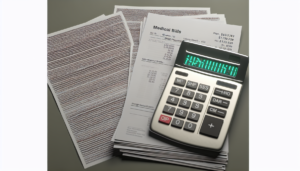Michigan Slip and Fall Lawyer: Choose Andriacchi Law as Your Personal Injury Lawyers
Have you been hurt in a slip-and-fall accident in Michigan? Finding the right Michigan slip-and-fall lawyer is the key to getting the fair compensation you need.
Here at Andriacchi Law, we’ll help you understand your rights and the steps to take post-accident with this guide. We’ll also explain how a Michigan personal injury lawyer’s expertise can lead to better outcomes for you. Hopefully, this will help victims with their personal injury claims.

Call now or fill out the form at the end of the post for a free consultation with our experienced attorney. We take cases on a contingency fee basis.
Key Takeaways
- Andriacchi Law’s Michigan slip and fall lawyer is crucial for complex premises liability laws and securing fair compensation for injuries, including economic and non-economic damages.
- To prove a slip-and-fall case, the property owner’s or possessor’s negligence and breach of duty in maintaining a safe environment are key.
- Proving the duty and breach requires quick action and evidence gathering after an incident.
- Michigan’s comparative-fault rule and strict three-year statute of limitations make prompt legal action vital to ensure the best outcome for a slip-and-fall lawsuit.
Navigating Michigan Slip and Fall Law with Expert Legal Assistance

Andriacchi Law’s expert Michigan slip and fall lawyer can simplify the complexities of your slip and fall accident. Dominic Andriacchi Jr. is well-versed in the intricacies of Michigan’s premises liability laws and is ready to:
- Stand up against the defendant’s insurance company’s lowball settlement offers
- Ensure you receive the reasonable reimbursement you deserve for your injuries
- Gather evidence such as incident reports, photographs, video surveillance, and eyewitness accounts
- Prove negligence and liability in your case
If successful, you can collect economic and non-economic damages in a potential settlement.
Economic damages include things like medical bills and lost income or wages. Non-economic damages include pain and suffering, mental anguish, and embarrassment, as well as the injuries you’ve suffered.
Your injury’s severity and the extent of your treatment are significant to determining the amount you should receive. For example, if you’ve suffered a brain injury that will last the rest of your life, you should receive more reimbursement than if you suffered a sprained ankle.
A reasonable, fair settlement should cover all these expenses and adequately compensate you for your pain and discomfort.
Understanding Premises Liability for Michigan Property Owners
Michigan property owners and property possessors are legally obligated to ensure their visitors’ safety. Their legal duty changes depending on the type of visitor.
For visitors who are “business invitees,” the owner/possessor must identify any potential hazards and make them safer to maintain a safe environment. If they don’t and as a result someone gets injured, the property owner/possessor is responsible.
A common “business invitee” is someone going to a store to buy groceries, for example.
If the visitor is a “licensee,” the premises owner/possessor must warn the visitor of potential hazards. An example here would be someone going to a friend’s house for a get-together.
If the visitor is a trespasser, the premises owner/possessor might still have an obligation in limited circumstances. Even trespassers can hold property owners accountable for their injuries in certain situations, proving that premises liability is indeed a complex field.
Responsibility can also get harder to understand in certain situations. For instance, in a multi-unit apartment, the landlord might be responsible for maintaining common areas, such as the entrance. On the other hand, in a rented home, it could either be the landlord or the tenant, depending on the lease agreement and specific circumstances.
This is why hiring a premises liability attorney is key to a successful premises liability lawsuit.
Key Steps to Take Following a Slip and Fall Accident
Following a slip and fall incident, you must act quickly.
First, seek immediate medical attention. Many times people don’t. Often, people are embarrassed, running on adrenaline, or don’t know that they are injured. So they don’t go to the hospital.
The defendant’s insurance company will claim you’re faking your injuries if you don’t go. Or, they’ll claim something else is the cause of your injury. They’ll conveniently ignore the fact that you were hurt at the defendant’s property.
So go to the hospital, even if you don’t think you have suffered serious injury.
Second, report the accident promptly to the property owner or manager. Request a written incident report and keep a copy for your records. Have a friend or family member gather evidence at the scene, such as photographs of the hazard.
Finally, be careful in your interactions post-incident. Don’t discuss your injuries or the accident with anyone. Don’t sign any documents without understanding them fully or consulting with a lawyer. Many times the defendant’s insurance company will call you to try and settle cheap. Don’t do it.
The Role of Negligence in Your Slip and Fall Case

In slip and fall cases, negligence is a pivotal factor. It means the property owner or possessor failed to exercise adequate care, which caused your injury. To establish negligence, four elements must be proven:
- Duty: the business or property owner or possessor had a duty of care
- Breach: the negligent property owner breached that duty
- Causation: the owner’s or possessor’s breach caused your injuries
- Damages: you suffered damages as a result
Proving negligence can get tricky. You must show that the property owner had full control over the area where the accident occurred. You must also show that the owner/possessor either created, knew, or should have known of the hazard.
This is also where the ‘res ipsa loquitur’ doctrine comes into play. This doctrine means that the accident would never have occurred without negligence. The defendant’s negligence is implied, even when you don’t have direct proof of it.
Identifying Breaches in Duty of Care in a Slip and Fall Case
A business owner or possessor must keep their premises safe and manage potential hazards. Failing to do so is a breach of their duty of care. This leads to a premises liability claim.
Identifying breaches in the duty of care can involve things like:
- spills, water, or fluid in walking areas
- obstacles in walkways, such as cords or cables
- poor lighting
- untreated icy surfaces
You must show that the property owner created, knew, or should have known about a dangerous condition to prove their negligence. It shows they failed to fix or warn about the hazard within a reasonable timeframe. This is commonly called “notice.”
Gather Evidence to Support Your Claim
Building a strong slip-and-fall case requires collecting evidence.
Photos or videos of the accident scene, particularly of the hazardous conditions that led to the incident, are vital.
Get witnesses’ contact information and statements, including:
- The details of the incident,
- The surroundings at the time of the incident, and
- The witness’s contact information for follow-up and verification.
An experienced Michigan slip-and-fall lawyer will gather and analyze the evidence. They will significantly help your chances of securing reasonable compensation.
Michigan’s Comparative Negligence and Your Slip and Fall Lawsuit

Michigan’s comparative fault rule can impact your lawsuit.
The defendant will blame you for your injury. This rule says that your compensation should be reduced based on your negligence. This is called the comparative negligence rule.
The judge will reduce the jury’s verdict based on the percentage of fault the jury assigns to you.
Let’s pretend the jury determines that you were 20% at fault. The judge will then reduce the verdict by 20%. So if the jury decides a fair appraisal of your injuries is $10.00, the judge will reduce the appraisal by $2.00. The defendant’s insurance company will pay you $8.00.
But there is a catch. If the jury thinks you are more than 50% at fault, you cannot receive any non-economic damages under Michigan law.
So in that same hypothetical, if the jury says you’re 51% at fault, the defendant’s insurance company doesn’t pay you any pain and suffering compensation.
This is why you must hire a seasoned Michigan slip-and-fall lawyer. You don’t want your case to be your attorney’s first rodeo.
Time Is of the Essence: Statute of Limitations in Fall Cases
For Michigan slip and fall cases, time is important.
Michigan law has a three-year statute of limitations from the date of the injury to file a lawsuit. Failure to adhere to this deadline can lead to your case being dismissed. You lose the chance to receive any compensation for your injuries.
So if your injury occurred on January 1, 2020, you have until three years later to file a lawsuit.
There are some occasions when the statute of limitations might be tolled or extended. For example, if the injured person is a minor, they may be allowed some additional time.
Hire a lawyer as soon as possible to preserve evidence and build your case. They’ll explain all of this to you.
Compensation in Slip and Fall Accidents

As we discussed previously, economic damages like medical expenses and lost wages are available. You can also get reimbursed for your non-economic damages, like pain and suffering for the injuries sustained. These are called “compensatory damages.”
The severity of your injuries, the impact they have on your daily life, and the extent of your treatment are major factors in determining the amount of reimbursement you can receive.
For example, the damage from a sprained ankle is much less than damage from lifelong traumatic brain injuries. Severe injuries, like any head injury, which is common with falls, or broken bones are treated differently than injuries that are less serious.
Your reimbursement should adequately cover your economic losses and noneconomic losses as well.
How Medical Bills Influence Settlement and Verdict Amounts
The amount you receive can be impacted by medical bills and the cost of ongoing treatment. Medical evidence, such as medical records, incident reports, and bills, can be important.
In a slip-and-fall settlement or verdict, all medical costs related to the injury, including doctor’s bills, hospitalization costs, and therapy expenses, are considered. Future medical costs are estimated and included, too.
These costs are classified as “special damages” and form part of the total financial settlement in the lawsuit.
But they are not the end-all-be-all.
For example, let’s pretend you have an arm amputated in an injury. It may cost only a few thousand dollars for surgery to amputate the arm.
But I guarantee losing your arm for the rest of your life is worth a heck of a lot more than a few thousand dollars.
On the other hand, if you need 24/7 care for the rest of your life, hiring an in-home caregiver or paying for residential treatment will be very expensive. But even in that example, the injuries and the impact they’ve had on the person are still worth more than the medical treatment bills indicate.
The long and the short of it is that medical bills are important, but they are one of the least important of all the considerations in your case.
Calculating Lost Wages and Future Earnings
Another critical component of slip-and-fall compensation is lost wages and future earnings. To calculate lost wages, a variety of methods are used including:
- Multiplying the number of missed hours by the hourly rate
- Determining the average daily pay and the number of days missed
- Adding up the hours missed for individuals who are paid by the hour
These methods can help determine the amount of compensation for lost wages in a slip-and-fall case.
To calculate future earnings, factors such as the expected earnings before the injury, the impact of the injury on the ability to work, and future career advancements are taken into account. Slip and fall injuries can significantly affect an individual’s earning capacity, especially if the injuries prevent them from performing the same work as before the accident.
Special Considerations for Slip and Fall Accidents on Government Property
Unique considerations come with slip and fall accidents on government property.
In Michigan, governmental entities have immunity from being sued for torts, with a few exceptions. This makes filing a slip-and-fall claim against the government particularly difficult, which makes hiring an experienced Michigan slip-and-fall lawyer important.
If you get injured on public premises, you need to determine who owns or is responsible for maintaining the premises where the injury occurred. The timeline for filing a claim against a government entity is shorter than for other types of claims, making it crucial to act swiftly and consult with a legal expert.
Can I sue my employer for a slip and fall in Michigan?
Generally, no, you cannot sue your employer for a slip and fall in Michigan. Instead, you must file a worker’s compensation claim to recover damages. There may be some limited circumstances when you can.
Dispelling Two Myths About Slip and Fall Cases
There are several myths about slip and fall cases that hurt victims. Insurance companies and insurance defense lawyers love to push these myths because they know it lowers fair verdict and settlements.
One such myth is the “Open and Obvious Defense.” With this defense, the property owner will claim that they had no duty of care because the hazard was so apparent that the victim should have avoided it.
Here’s the thing: this defense has nothing to do with premises liability law.
Instead, the open-and-obvious defense started in product-liability cases. In those cases, the manufacturer would say that the danger posed by a product was open and obvious – thus, the victim should not have used the product in the way that they did. For example, everyone looking at a sharp, pointy knife knows it’s dangerous.
That makes sense. But then Michigan appellate courts started applying it to slip-and-fall cases, too.
But applying it in slip-and-fall cases, where the person cannot necessarily see the danger – does not make sense. For example, looking at a knife, we can tell it’s dangerous. But we don’t necessarily look directly at our feet when walking.
Thankfully, the Michigan Supreme Court got rid of this defense. Property owners must exercise reasonable care to protect visitors from dangerous conditions, regardless of how obvious the danger might seem.
This ruling shifts the focus from the victim’s ability to perceive the danger to the landlord’s responsibility to maintain a safe environment, potentially improving the compensation prospects for slip-and-fall victims.
A second common myth is the “you should watch where you’re going” myth. With this one, the defense lawyer will claim that “people should watch where they’re going.”
But here’s the thing: no one stares directly at their feet while walking. Instead, studies show we look approximately 15-20 feet ahead of us. Also, things in our peripheral vision do not catch our attention, unless there’s something special about it.
For example, if you look ahead of you while walking in a parking lot, the parking lot will not necessarily catch your eye. But the orange traffic cones will.
If you want to learn more about this, research the difference between “visibility” and “conspicuity.” Just because something is visible – meaning it can be seen – does not mean it is conspicuous – meaning it will catch our attention and we will focus on it.
When Insurance Companies Get Involved
In slip-and-fall cases, the property owner’s insurance company will get involved.
Their goal is to minimize your reimbursement. They will pull tactics such as pushing for a speedy, low settlement and rigorously investigating the details of the accident to attribute some blame to the victim. If you accept the insurance company’s settlement offer, you waive your right to sue for additional compensation.
Frankly, you should never talk with an insurance company on the phone. They’ll record you and, no matter what you say, will either use it against you or won’t give you your statement.
You must consult with a Michigan slip-and-fall lawyer before agreeing to any settlement offers. Your lawyer will make sure you’re getting a fair deal and protect you from the insurance company’s tactics.
Proven Track Record: Success Stories from Our Personal Injury Law Firm
Our personal injury law firm has a long history of success in handling personal injury cases, including slip and fall cases. As a skilled fall accident lawyer, you can see our page dedicated to our Michigan personal injury settlements and verdicts.
Selecting the Right Michigan Slip and Fall Lawyer for Your Case
Hopefully, by now you understand what it takes to select the right Michigan slip-and-fall lawyer for your case. You should hire a lawyer who has:
- A lot of experience in personal injury law
- A strong focus on slip and fall cases
- Excellent negotiation and communication skills
- Knowledge and understanding of the medicine behind your injuries
- Taken cases to trial and won.
To confirm their legitimacy and expertise, consider:
- Looking for recommendations from trusted individuals
- Reaching out to their legal team for a free consultation
- Asking them a series of questions about their experience, case handling strategies, and fee structure during your initial consultation
This will help you make an informed decision and ensure you have the best legal representation for your case.
Call Now for a Free Slip and Fall Consultation
Navigating the complexities of a slip-and-fall case can be daunting, but with the right Michigan slip-and-fall lawyer on your side, you can confidently face the challenges ahead.
Whether your case involves governmental property, insurance company negotiations, or proving negligence, Andriacchi Law will guide you every step of the way, ensuring your rights are protected and you receive the fair compensation you deserve.
Remember, in the face of adversity, you are not alone. We are your ally, ready to fight for justice on your behalf.